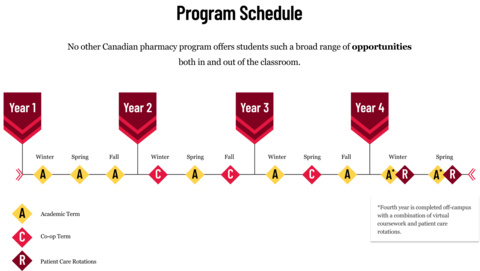The PharmD Undergraduate Student Handbook is a resource containing essential information about the PharmD program. It outlines details about program requirements, the School of Pharmacy itself, academic policies and regulations, professionalism, and other key general information.
All PharmD students are responsible for knowing the content of the handbook and required to complete the PharmD Undergraduate Student Handbook Acknowledgement form.
Questions about the handbook may be directed to pharmacy.advisor@uwaterloo.ca.
The PharmD program has academic and experiential elements that are all degree requirements.
See below for academic, experiential, and electronic requirements and other information specific to the program.
Academic requirements for participation in the PharmD program
The PharmD program has various academic requirements that students must familiarize themselves with prior to beginning the program. Information has been provided to educate students on course sequence and descriptions, important dates, timetables, class schedules, and graduation.
Experiential requirements
The University of Waterloo School of Pharmacy is unique among pharmacy schools in Canada in that we offer a robust experiential learning program which includes:
Co-operative Education
Three paid co-op work terms are completed throughout the program and allow students to explore a variety of practice settings.
Patient Care Rotations
Take place during the last two terms of the program (4A and 4B) and comprise of direct patient care clinical placements completed in one of 14 regions throughout Ontario. These are academic courses that have associated tuition and fee requirements
Interprofessional Education (IPE)
IPE’s goal is to provide students with opportunities to learn with, from, and about other health care professionals and students in order to prepare them to improve patient outcomes through interprofessional collaboration.
Post-Admission Requirements
To participate in and complete the experiential curricular components of the PharmD program, students must fulfil a number of immunization and documentation requirements. Cohort-specific requirements are outlined on the Post-Admission Requirements web page.
Living arrangements and transportation requirements for participation in the PharmD program
The PharmD program is an in-person program which requires students to live in the Waterloo Region or within a reasonable commuting distance. Those travelling via public transit are expected to adequately plan ahead to ensure they are able to arrive on time for mandatory academic activities.
Students will be responsible for their own transportation and living arrangements, during the experiential components of the PharmD program (co-op and clinical rotations).





